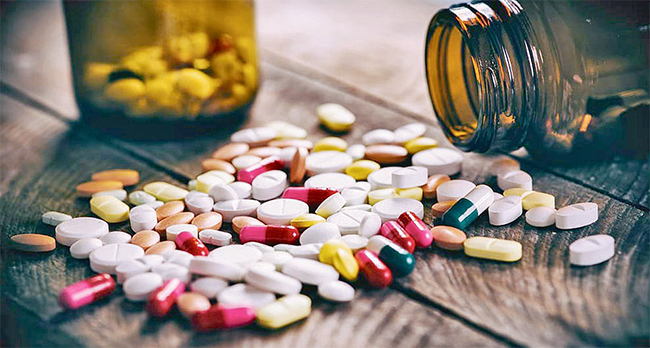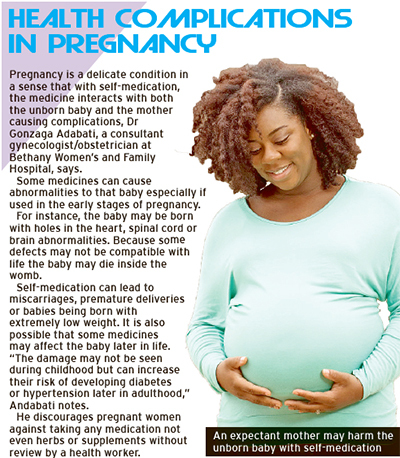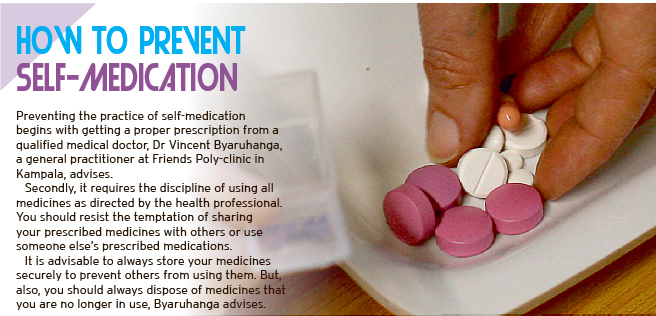Self-medication a cause of drug resistance and toxicity -Experts
During the lockdown, many could not access the hospitals or trek the long distances to access a doctor. Most were forced to self-medicate, an action that could be harmful, causing damage to one's body. Health personnel continue to warn against self-medication since it could have adverse effects, writes Agnes Kyotalengerire.
WHAT DOES ONE DO IN ABSENCE OF A DOCTOR?
Mid-April this year, Mariam Businge, 26 developed severe cough and fever. Unfortunately, Businge could not access medication from a health facility due to a ban on both private and public transport, yet, the nearest health facility was located 10km away.
Left with no option, Businge resorted to buying medicines from a drug shop in her neighborhood.
Due to financial constraints, she could not afford to buy a full dose of antibiotics and anti-malarial medication. She would instead buy small quantities to last her a day or two until she could not afford it anymore. As a result, Businge has continued to battle with cough and fever for close to two months now.
During the lockdown, the number of patients registered at health facilities dropped drastically.
So, had people stopped falling sick, or were they finding alternatives to hospital visits? What does one do in the absence of a doctor? Many, it seems, resorted to self-medication because the pharmacies and drug shops remained open within the communities. As such, people found it convenient to walk to drug stores and buy medicines as opposed to trekking long distances to health facilities.
Although the practice of self-medication seemed a cheaper and convenient option for most people, ealth experts warn that self-medication has severe long term consequences.
Potential risks of self-medication practices include: wrong diagnosis, delays in seeking medical advice when needed, severe or adverse reactions, dangerous drug interaction, and incorrect drug administration, incorrect dosage and masking of severe diseases.
What is self-medication Self-medication is the practice of selecting and using medicines by individuals to treat self- recognized or diagnosed health conditions and symptoms, according to Dr. Vincent Byaruhanga, a general practitioner at Friends Polyclinic in Kampala.
It involves buying medicines over the counter to treat physical and psychological ailments.
Ideally, for most drugs, one needs to present a prescription from a doctor before they can buy drugs from a pharmacy.
Byaruhanga explains that the right medical prescription should be written out properly, indicating the date, name of the patient, age, sex, type of disease (diagnosis), drug and duration for which the medicine should be taken.
It should also include the name of the health facility, plus their signature.

OVERLOOKED DISEASES/CONDITIONS
Dr.Duncan Ndahura, a general practitioner at International Hospital Kampala, says the biggest danger with buying medicines over the counter and self-medicating is that you are not sure of what you are treating.
The chances of taking the wrong drug for a wrong health condition are increased since you have not been examined by a medical worker, Ndahura says. For example, you might be taking a painkiller to treat a headache when the actual cause is malaria. In so doing, malaria, which is the underlying health condition, is missed, hence resulting into severe complications or even death because it was not detected and treated early.
DRUG RESISTANCE
Drug resistance is the biggest danger resulting from self-medication due to improper use of drugs that only require medical prescription such asantibiotics, strong pain killers and even anti-malarials.
Byaruhanga says drug resistance is the major reason hospitals no longer harbour the smell of medicines, such as penicillin and chloroquine.
"Due to improper usage, people's bodies got used to such medicines and, eventually, other stronger medicines had to be brought on board," he notes and is quick to add that; when you have not been examined by the doctor, you increase the risk of taking a low dose. For example, you might be using antibiotics in insufficient doses.
Patrick Oketcho, a pharmacist in Kampala, explains that dosages vary based on age and body weight. For example, a man weighing 110kg may be required to take more capsules of an antibiotic compared to one who weighs 70kg. So, choosing to self medicate ay result into taking too much or too little medicine.
Specifically, the drug fails to work efficiently because it is taken in little amounts but frequently, consequently, it keeps circulating in the body and the system gets used to it, Oketcho says.

Highlighting the effects of drug resistance, the chief executive of the National Drug Authority (NDA), Dr. David Nahamya says it also heavily impacts on the economy.
For instance, when the population faces drug resistance, it means the government has to go in for more expensive and medicines. For example, he says, the rnment had to resort to expensive anti-malarial drugs, such as coartem, after the more affordable drugs, such as chloroquine and fancidar, failed to work.
"In the long run, the treatment may turn out to be expensive and you may have to be admitted. Yet, it would have been cheaper if you got to the hospital early," Nahamya says.
In the worst case scenario, taking an under-dose by self-medication can also result in loss of life, especially if the disease progresses to complications as a result of improper treatment.
Dr Charles Olaro the commissioner in charge of clinical services at the health ministry notes that Kampala is already experiencing drug-resistance resulting from misuse and over-use of antibiotics following self-medication.
Simon Mukiibi, a practicing dispenser based in Kampala, testifies that self-medication is rampant.
Mukiibi estimates that half of the people who walk into his pharmacy are self-medicating. Olaro says there is need to sensitise people about the dangers of selfmedication.
RISK OF DRUG INTERACTION
Oketcho further notes that some medicines have got an antagonistic effect or may affect the effectiveness of another.
For example, if you are on antiretroviral (ART) medication and you took high dose of vitamin C, you could prevent the ART medication from working effectively.
PATIENT AND DOCTOR INTERACTION VITAL
Similarly, Dr William Lumu, who is the president of the Uganda Diabetes Association condemns self-medication, noting that individuals battling with diseases such as diabetes or hypertension, may require drug adjustments every time they are reviewed, which a patient may not be able to do if they are self-medicating.
Medicine is not like food that is taken without a escription. The body keeps on changing in terms of metabolising the medicine, the way it handles bi-products (toxins) and excreting it, details that a patient may not know if they self-medicate, he notes.
It is upon that background that Lumu advises having a medical examination and the correct diagnosis and treatment, to avoid improper drug-use related complications.

Dr Robert Kalyesubula, the head of the renal unit at Mulago Hospital, agrees with Lumu. He says the art of medicine heavily lies on the patient and doctor interaction. However, all that has been eroded by the COVID-19 lockdown as people opted to self-medicate with limited access to health facilities.
Yet, the practice of self-medication fuels complications for vital organs.
For instance, kidney disease in diabetic patients is asymptomatic; meaning that a person may have developed kidney disease, but is not showing signs and symptoms.
This may result into late detection of the disease after it has progressed to severe complications.
Additionally, self-medication is associated with toxicity, due to over-dose, given the fact that some pharmacists give medicines basing on the money one has.
Kalyesubula explains that in particular, toxicity may cause kidney problems. For instance, a patient could have had a kidney functioning level at 70%. But after three months of self-medication, the functionality could have dropped to 30%, causing even the normal dose they could be taking to cause complications.

Medicines that may damage the kidney include: some strong painkillers, some arthritis drugs, ulcers, antibiotics especially the injectable type. Even the ordinary antibiotics, if not taken in the right doses, can damage the kidney, he cautions.
Taking drugs that can cause hypersensitive reaction can also damage the kidney including by going directly to it.
The kidney has a filter and, sometimes, it may get damaged as the toxins of the drugs pass through it.
Sometimes, the toxins cause reactions to other organs, for instance, they can interfere with the blood supply to the kidney, reducing it drastically, so that the kidney does not receive enough blood.
To avoid complications, Kalyesubula advises patients to be diligent and consult the doctors before taking any form of medication.
Similarly, doctors need to be responsive whenever approached by the patients so that they help them get the right medicine, he notes. The other challenge with self-medication is failure to manage side effects of the drug, Byaruhanga notes.
Ideally, a doctor is supposed to explain the side effects of the drug to the patient and how to manage them.
When an individual just buys drugs from the pharmacy, they miss guidance on how to manage side effects. Yet, side effects can be life threatening, for example Stephen Johnson syndrome can kill, he warns.
WHAT ARE THE OPTIONS?
In the event that you cannot get to a health facility, Byaruhanga suggests calling a family medical doctor while at a pharmacy, so the prescription can be done over the phone. If you don't have a family doctor, or a doctor that you see regularly, this is the time to find one.
However, Kalyesubula is quick to say that the challenge with telephone prescription is no one is held accountable in the event that something went wrong since nothing is documented.
According to Olaro, teleconferencing with the patient comes in handy when one fails to access a health facility.
Currently, there are a number of organisations dealing in online consultations that have been set up to guide patients who fail to access hospitals.